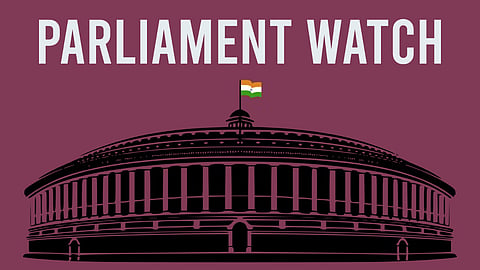
- News
- Columns
- Interviews
- Law Firms
- Apprentice Lawyer
- Legal Jobs
- हिंदी
- ಕನ್ನಡ

The 2023 Budget Session of Indian Parliament on Thursday saw questions answered on the government's role in the process of judicial appointments long pending cases across various courts and representation of women at the Bar and the Bench.
Kerala MP Dr John Brittas sought information on Supreme Court Collegium proposals returned by the Central government during the last three years, and data on the proposals reiterated by the Collegium.
The reply by Union Law Minister Kiren Rijiju stated that as on January 31, 2023, reconsideration of Collegium recommendations has been sought for 18 proposals.
Of these, 6 cases were reiterated by the Collegium. In 7 cases, the Collegium has sought updated inputs from High Court Collegiums, and 5 proposals have been remitted to the High Courts.
Additionally, in response to a question by Punjab MP Raghav Chadha regarding the Supreme Court Collegium recommendations wherein approval is still pending from the government, Rijiju disclosed that 64 such recommendations were under various stages of processing with the government.
To another question by Brittas, the Ministry revealed that 142 proposals recommended by the High Court Collegiums are at various stages of processing. Of these, 4 are pending with the Supreme Court Collegium and 138 were pending with the Central and state governments.
As on January 30, 2023, recommendations in respect of 191 existing and 45 anticipated vacancies during next six months are yet to be received from High Court Collegiums, which are in breach of six months’ advance timeline for making recommendation for anticipated vacancies, the response further stated.
To a question by Rajya Sabha MPs Vivek K Tankha and Sushil Kumar Gupta, the Law Ministry revealed that no suggestion was made to the Supreme Court to include a nominee of the government in the Collegium for appointments to the higher judiciary.
Another question by Bihar Rajya Sabha MP Ram Nath Thakur asked whether the government was heading towards appointing its representative in the process of appointment of judges.
Union Law Minister Kiren Rijiju replied that the Central government has suggested to the Supreme Court Collegium that a government nominee be included on a Search-cum-Evaluation Committee, consisting of representatives from the Central and state governments, to prepare a panel of eligible candidates for appointment as judges in the Supreme Court and High Courts.
"This, alongwith other measures suggested will pave the way for a more transparent, accountable and expeditious mechanism for appointment of Judges to the Constitutional Courts," the reply stated.
To a question by Harbhajan Singh, the Law Ministry revealed that based on the Indian population count of 1210.19 million as per the Census of 2011, the judge - population ratio in the country works out to be approximately 21 judges per million.
It was also revealed that as on January 30, 2023, as against a sanctioned strength of 25,077 judges, district and lower courts across the country have a working strength of 19,310 judges, with 5,767 vacancies.
Madhya Pradesh MP Rajmani Patel sought data on civil as well as criminal cases pending in various courts for over fifty years.
The reply by the Law Ministry stated that as on January 27, 2023, as per the Integrated Case Management Information System (ICMIS), there are no cases in the Supreme Court that have been pending for more than fifty years.
As per the National Judicial Data Grid (NJDG), the total number of criminal and civil cases pending for more than 50 years as on January 31, 2023, are as under:
Of the 1,514 cases pending across High Courts, 1,192, 133 and 129 cases are pending before the High Courts of Calcutta, Delhi and Madras respectively.
To a question by nominated Rajya Sabha MP Rakesh Sinha pertaining to proportion and strength of women judges and lawyers in High Courts and the Supreme Court, it was revealed that as on January 31, 2023, 106 of the 775 (13.6%) judges in High Courts are women. Notably, no Chief Justice of a High Court is a woman.
As per data for fifteen states provided by the Bar Council of India, there are 2,84,507 women lawyers, accounting for 15.31% of the total enrolled 15,42,855 lawyers.